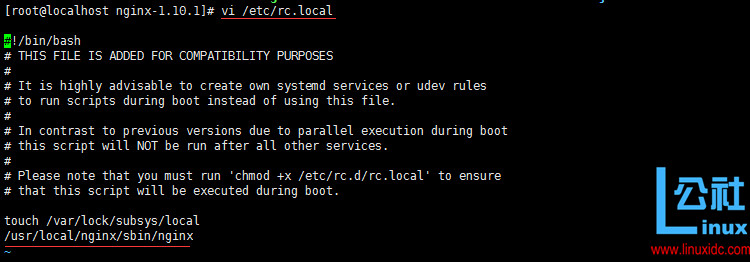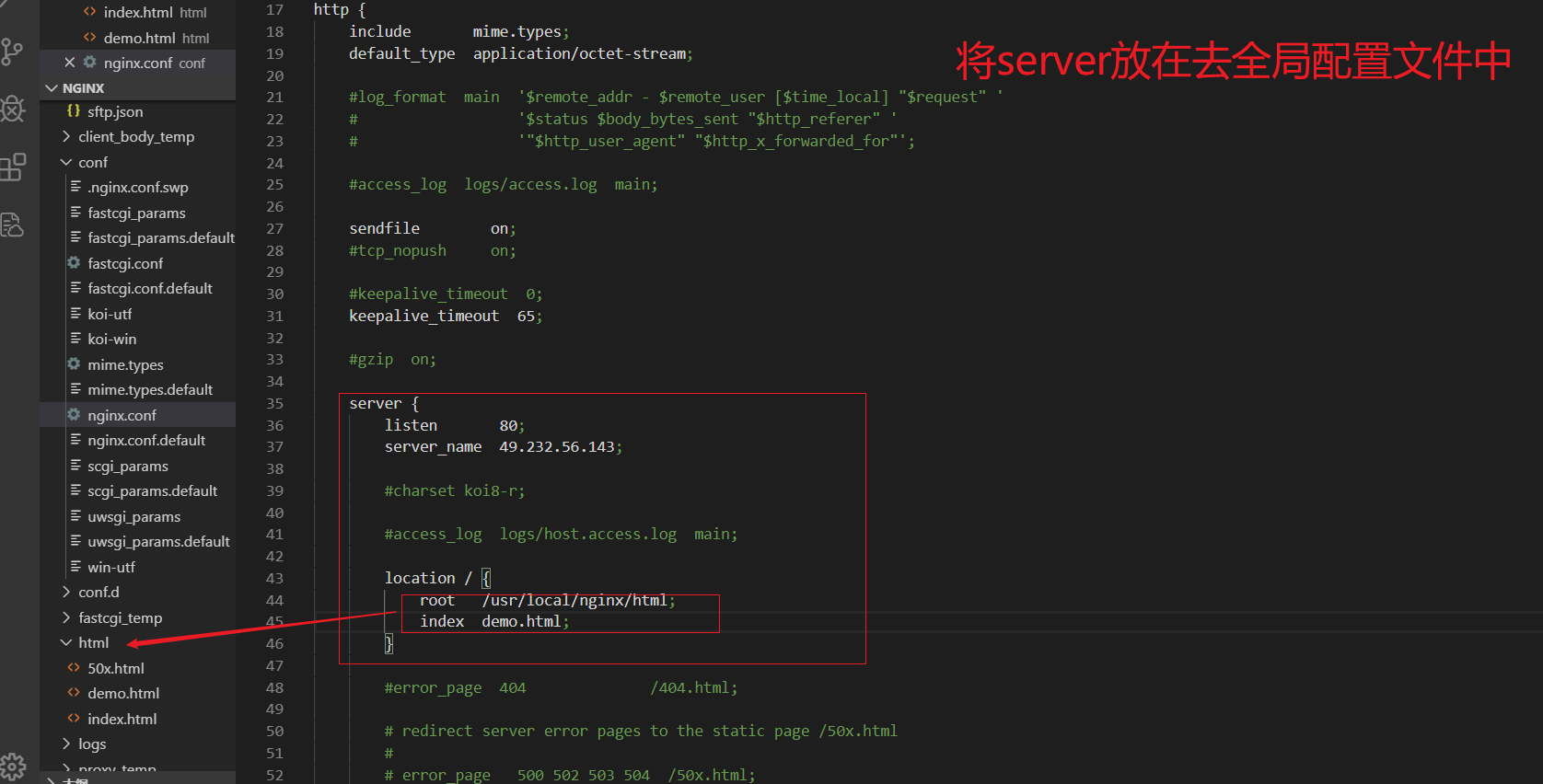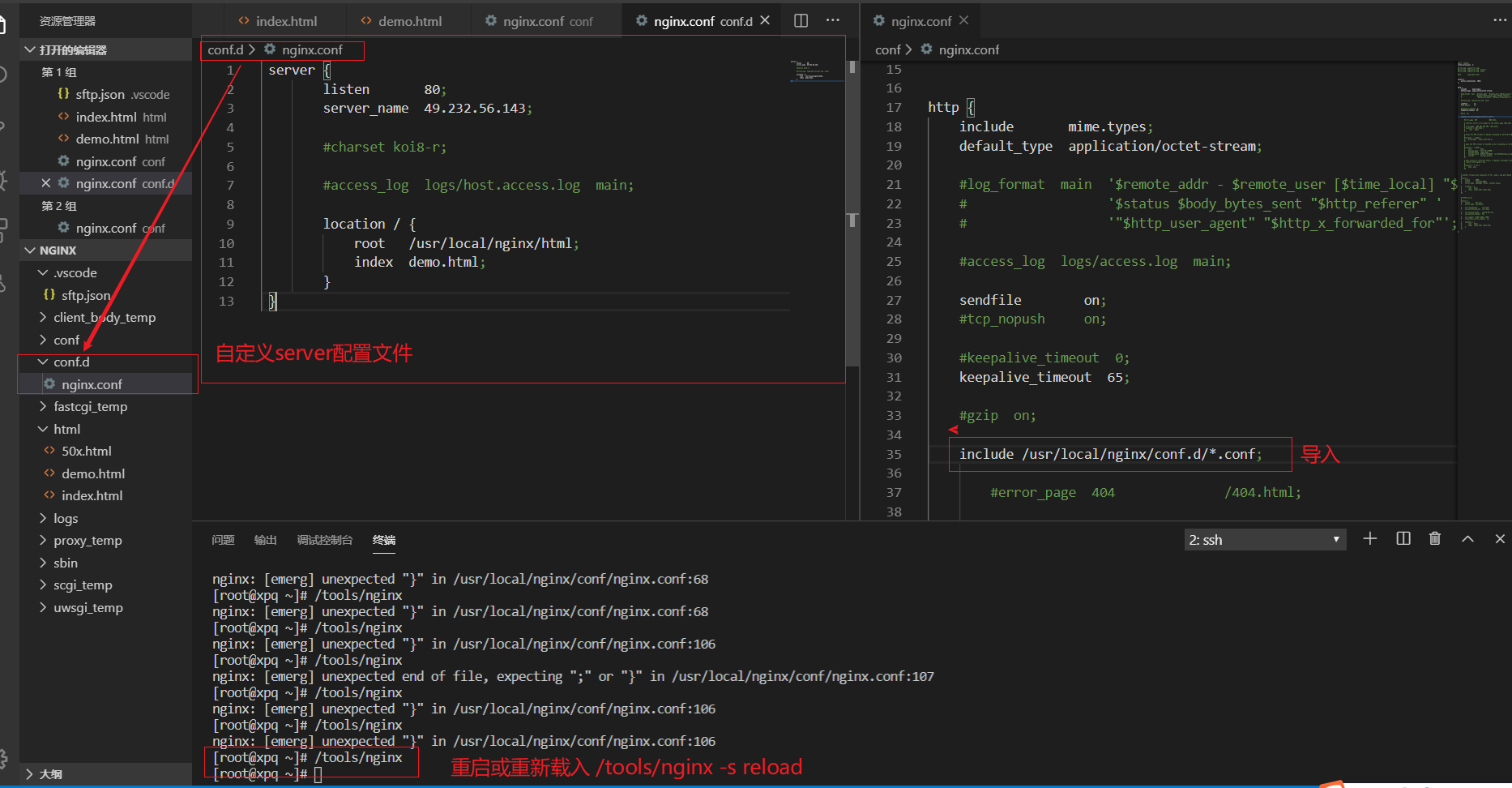Nginx
一:安装nginx
1:安装Nginx所需的pcre库
[root@xpq ~]# yum install pcre pcre-devel -y [root@xpq ~]# rpm -qa pcre pcre-devel pcre-8.32-17.el7.x86_64 pcre-devel-8.32-17.el7.x86_64 [root@xpq ~]#
1:创建存放文件的目录 [root@xpq tools]# pwd /home/xpq/tools [root@xpq tools]# 2:下载Nginx [root@xpq tools]# wget http://nginx.org/download/nginx-1.6.3.tar.gz 3:解压 [root@xpq tools]# tar xf nginx-1.6.3.tar.gz [root@xpq tools]# ll total 788 drwxr-xr-x 8 1001 1001 158 Apr 7 2015 nginx-1.6.3 -rw-r--r-- 1 root root 805253 Apr 8 2015 nginx-1.6.3.tar.gz [root@xpq tools]# 4:查看文件目录 [root@xpq tools]# ls nginx-1.6.3 nginx-1.6.3.tar.gz [root@xpq tools]# cd nginx-1.6.3/ [root@xpq nginx-1.6.3]# ls auto CHANGES CHANGES.ru conf configure contrib html LICENSE man README src [root@xpq nginx-1.6.3]# 5:查看配置帮助 [root@xpq nginx-1.6.3]# ./configure --help 6:安装 [root@xpq nginx-1.6.3]# yum install openssl openssl-devel -y 7:配置
[root@xpq nginx-1.6.3]# ./configure --user=xpq --group=xpq --with-http_ssl_module --with-http_stub_status_module --prefix=/application/nginx-1.6.3/
8:检查是否安装成功
[root@xpq nginx-1.6.3]# echo $?
0
[root@xpq nginx-1.6.3]#
root@xpq nginx-1.6.3]# make
[root@xpq nginx-1.6.3]# make instsll
9:创建软连接
[root@xpq ~]# mkdir /application/
[root@xpq ~]# ln -s /application/nginx-1.6.3/ /application/nginx
10:测试
[root@xpq ~]# /application/nginx/sbin/nginx -t
nginx: the configuration file /application/nginx-1.6.3//conf/nginx.conf syntax is ok
nginx: configuration file /application/nginx-1.6.3//conf/nginx.conf test is successful
11:启动
[root@xpq ~]# /application/nginx/sbin/nginx
[root@xpq ~]#
12:网页查看
[root@m01 home]# curl 172.16.1.7
<!DOCTYPE html>
<html>
<head>
<title>Welcome to nginx!</title>
<style>
body {
width: 35em;
margin: 0 auto;
font-family: Tahoma, Verdana, Arial, sans-serif;
}
</style>
</head>
<body>
<h1>Welcome to nginx!</h1>
<p>If you see this page, the nginx web server is successfully installed and
working. Further configuration is required.</p>
<p>For online documentation and support please refer to
<a href="http://nginx.org/">nginx.org</a>.<br/>
Commercial support is available at
<a href="http://nginx.com/">nginx.com</a>.</p>
<p><em>Thank you for using nginx.</em></p>
</body>
</html>
[root@m01 home]#
13:如果启动了,再次启动会失败
[root@xpq ~]# /application/nginx/sbin/nginx
nginx: [emerg] bind() to 0.0.0.0:80 failed (98: Address already in use)
nginx: [emerg] bind() to 0.0.0.0:80 failed (98: Address already in use)
nginx: [emerg] bind() to 0.0.0.0:80 failed (98: Address already in use)
nginx: [emerg] bind() to 0.0.0.0:80 failed (98: Address already in use)
nginx: [emerg] bind() to 0.0.0.0:80 failed (98: Address already in use)
nginx: [emerg] still could not bind()
[root@xpq ~]#
解决方案
[root@xpq ~]# killall nginx
[root@xpq ~]# /application/nginx/sbin/nginx
[root@xpq ~]#
3:查看Nginx的版本信息
[root@xpq ~]# /application/nginx/sbin/nginx -V nginx version: nginx/1.6.3 built by gcc 4.8.5 20150623 (Red Hat 4.8.5-36) (GCC) TLS SNI support enabled configure arguments: --user=xpq --group=xpq --with-http_ssl_module --with-http_stub_status_module --prefix=/application/nginx-1.6.3/ [root@xpq ~]#
注:
- 本人最后将nginx 安装在了 /tools/中
- Nginx 的安装路劲 /usr/local/nginx
- nginx 的配置文件 /usr/local/nginx/conf/nginx.cof
二:开机自启动
vi /etc/rc.local

二:配置的两种方式
1:全局配置文件里面配置

2:自定义后缀名为.conf 的server对文件,然后在全局配置文件里面导入

四:路劲匹配的优先级
server { listen 0.0.0.0:80; # server_name 49.232.56.143; #charset koi8-r; #access_log logs/host.access.log main; #通用匹配 (第三) location / { root /usr/local/nginx/html; index demo.html; } # #精确匹配 (最高) # location = / { # return 404; # } # #优先匹配 (第二) # location ~/ { # return 405; # } }
六:try_files 和return的使用及区别
#----------try_files 和return 的使用 #try_files 匹配根路劲 / 是无效的 # location /a { # try_files $uri $uri/ =401; # } #try_files 配合 @的使用 location /a { try_files $uri $uri/ @meiduo; } location @meiduo { try_files $uri $uri/ =405; }
七:root 和 alias 的区别
# ------匹配路劲后面的斜杠问题() #root 和 alias 同时指定 文件路劲 不同之处在于 #(1):匹配跟路劲的时候,root后面不需要/,alias后面需要/ # location / { # alias /usr/local/nginx/html/; # index demo.html; # } #(2): 匹配子路劲的时候使用alias,使用root是找不到的 location /a { alias /usr/local/nginx/html/; index demo.html; }
八:访问权限与文件下载
#访问控制 location / { stub_status on; #返回nginx的状态信息 allow 10.236.56.143;#指定那个ip的客户端访问 deny all; #除了允许的,其他都拒绝 } #目录下载控制 location /download { alias /usr/local/nginx; autoindex on; }
九:配置文件详解
1:全局配置:
主要是全局性的和服务级别的属性配置,常见的主要有以下几种设置:
#user nobody; #设置使用用户(worker) worker_processes 1; #进行增大并发连接数的处理 跟cpu保持一致 八核设置八个 #error_log logs/error.log; #nginx的错误日志 #error_log logs/error.log notice; #error_log logs/error.log info; #pid logs/nginx.pid; #nginx服务启动时候pid events { #定义事件相关的属性 worker_connections 1024; #一个进程允许处理的最大连接数 #use 定义使用的内核模型 } http { #主要配置server通用的一些配置 include mime.types; # 文件扩展名与文件类型映射表 default_type application/octet-stream; # 默认文件类型 #log_format main '$remote_addr - $remote_user [$time_local] "$request" ' # '$status $body_bytes_sent "$http_referer" ' # '"$http_user_agent" "$http_x_forwarded_for"'; #access_log logs/access.log main; sendfile on; # 开启高效文件传输模式。 #tcp_nopush on; # 防止网络阻塞 #keepalive_timeout 0; keepalive_timeout 65; # 长连接超时时间,单位是秒 #gzip on; # 开启gzip压缩输出 server { listen 80; #端口 server_name localhost; #主机名 #charset koi8-r; #access_log logs/host.access.log main; location / { root html; index index.html index.htm; } #error_page 404 /404.html; # redirect server error pages to the static page /50x.html # error_page 500 502 503 504 /50x.html; location = /50x.html { root html; } # proxy the PHP scripts to Apache listening on 127.0.0.1:80 # #location ~ \.php$ { # proxy_pass http://127.0.0.1; #} # pass the PHP scripts to FastCGI server listening on 127.0.0.1:9000 # #location ~ \.php$ { # root html; # fastcgi_pass 127.0.0.1:9000; # fastcgi_index index.php; # fastcgi_param SCRIPT_FILENAME /scripts$fastcgi_script_name; # include fastcgi_params; #} # deny access to .htaccess files, if Apache's document root # concurs with nginx's one # #location ~ /\.ht { # deny all; #} }
server常见的属性
server { listen 80; #端口 server_name 49.232.56.143;#主机名 #charset koi8-r; #access_log logs/host.access.log main; location / { root /usr/local/nginx/html; #定义文件目录 index demo.html; #指定返回的首页文件 #return 404; 定义相应请求后的http状态码 } }
十:反向代理的使用
server { listen 0.0.0.0:80; location / { proxy_pass http://0.0.0.0:8000; #反向代理请求转发 } } server { listen 0.0.0.0:8000; location / { root /usr/local/nginx/html; index demo.html; } }
十一:负载均衡的使用
#负载均衡 upstream meiduo { #默认轮训 # server 0.0.0.0:8000; # server 0.0.0.0:8001; # server 0.0.0.0:8002; #加权轮询 # server 0.0.0.0:8000 weight=1; # server 0.0.0.0:8001 weight=2; # server 0.0.0.0:8002 weight=3; #ip_hash 第一次请求的时候匹配一个ip,以后每次请求都是用这个ip ip_hash; server 0.0.0.0:8000 weight=1; server 0.0.0.0:8001 weight=2; server 0.0.0.0:8002 weight=3; } server { listen 0.0.0.0:80; location / { proxy_pass http://meiduo; #反向代理请求转发 } } server { listen 0.0.0.0:8000; location / { root /usr/local/nginx/html; index demo.html; } } server { listen 0.0.0.0:8001; location / { root /usr/local/nginx/html; index 8001.html; } } server { listen 0.0.0.0:8002; location / { root /usr/local/nginx/html; index 8002.html; } }
十二:日志使用


